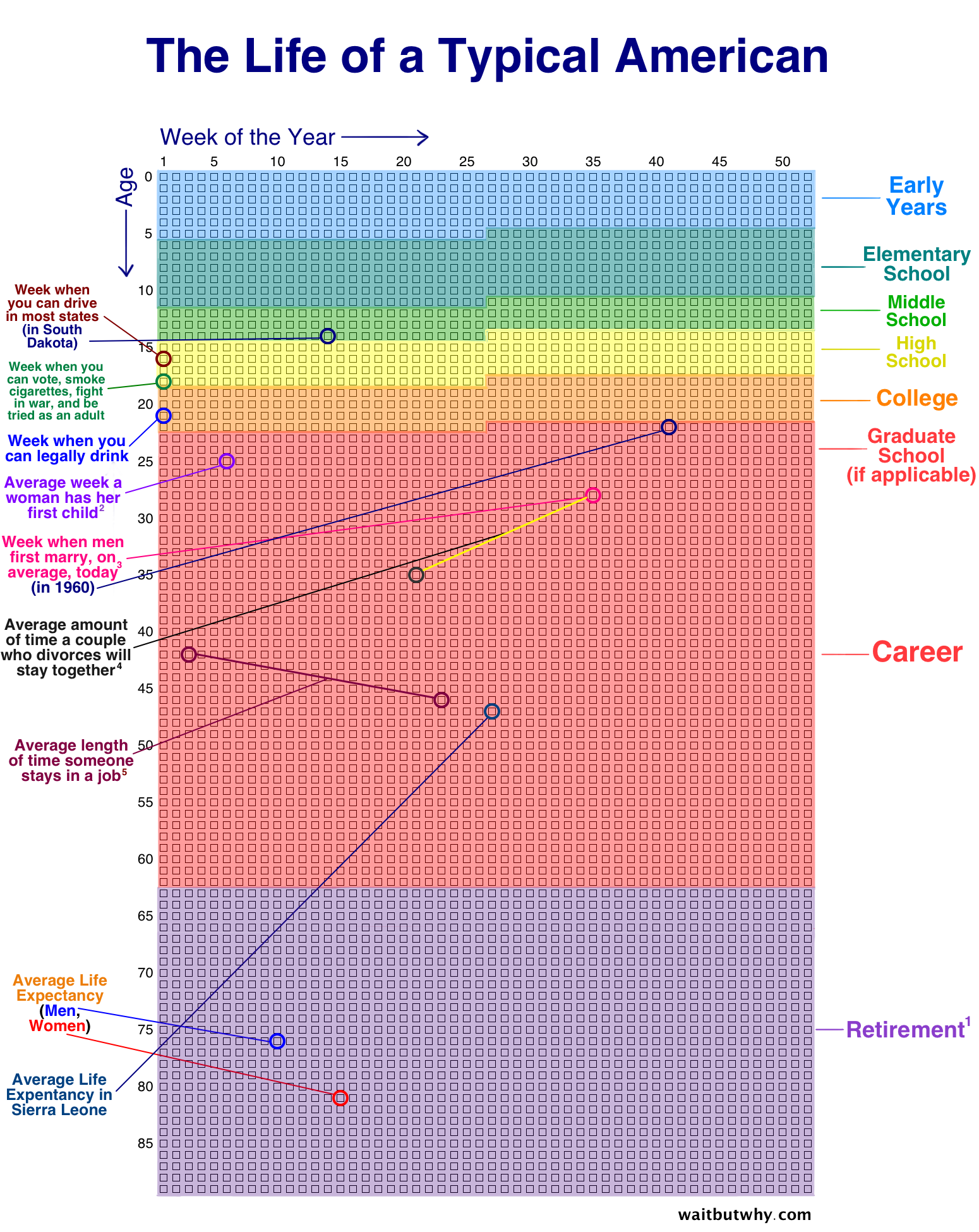Hey founders…
You want your company to grow. You want it to be immensely successful. You want to raise money and scale and maybe even be famous.
Willpower Isn’t Enough
I found this quick 4min video really interesting. It talks about how willpower isn’t enough to accomplish change. Similarly, neither giving someone an explanation of what’s wrong.
To truly get change, you have to have an insight. A new thought. That “aha” moment is what really drives change.
Leadership vs. Management
I recently read Claire Hughes Johnson’s book and loved it. She talks about the difference between management and leadership. Both are necessary but they’re not the same thing. I found 3 interesting parts…
Continue reading “Leadership vs. Management”There’s So Much Time Left
I always enjoy the writings of Tim Urban and love his blog Wait But Why I recently saw a tweet of his where he visualized the life of a typical American. It looks like this:

Changing Identity to Achieve Goals
I just read the book Atomic Habits and really enjoyed it. Specifically, there was one part that really called out to me and it was about how to accomplish your goals.
As the author James Clear says, there are really mainly 3 ways to change
- Change your outcomes. Set new goals
- Change your processes. Set new habits, new activities, new meetings
- Change your identity or your beliefs. Set new thoughts or perspectives
Getting Rid of Scars
We all have things in our past that we frequently remember, good and bad. Some bad memories in my past are events where I’m really embarrassed about my behavior: women I treated poorly, friends I didn’t respect as much as a should, and situations that I let get out of hand to a place where I was uncomfortable. I would do all of them differently now but it’s obviously too late to fix. These events pop up all the time in my head. I relive them, briefly, but regularly.

Imagine a river flowing. This river is my energy as a person. Now imagine a rock in that river. The water moves to go around the rock. It still flows and isn’t blocked much but the flow is somewhat disrupted. Each one of these memories is one of those rocks. These are memories that get me charged up and that charge takes away from me doing other positive things and having positive thoughts.
This past weekend, I undertook an exercise to get rid of those rocks.
Continue reading “Getting Rid of Scars”ETW: Two Years In
I’ve been working at Enjoy the Work now for two years and I wanted to take a minute to reflect what I’ve learned. For those who don’t know Enjoy the Work, we’re a firm that works closely with startup founders to help them become great CEOs. We’re a group of 12 former operators and investors. We’ve worked with more than 140 startups since 2015.

Some reflections on the past 2 years:
It’s so different than operating
When working inside a company, you have to hustle every minute of every day. You roll up your sleeves and make shit happen. When I started, I brought that same energy to my calls with founders and it wasn’t right. This job is not about doing, it’s about listening and asking questions. I still do a lot of work but it’s different, it’s about working to serve the CEO not on the business. Which brings me to my next point…
It’s all about listening
Not just listening but listening deeply. What is the real problem? and the problem behind the problem? Finding the right issue to talk about is often the most important thing. And it’s not just listening to the business problem but the tone and non-audio clues as well. This job is all about understanding and focusing on the right issue.
Being an advisor is not only about giving advice
As an advisor you need to have opinions and thoughts on how to help, but there’s more to it than that. When I first started, I had answers and was eager to give advice. But that sometimes wasn’t the most effective. That is giving someone a fish instead of teaching them. It took a bit to change to recognize when to teach and when to just hand over a fish.
I’ve learned so much. Functional areas. Coaching.
I had learned a lot from time at Kapost, Airbnb and Onward so I have a good background to draw on. What’s been fun about this role is getting the chance to read all the books that I never had the time to fully absorb. I’ve made my way through most of the top business books now. I also have 11 other incredible partners who have amazing experiences that they’ve taught me about. What has surprised me is how fun it is to learn.
The drama triangle is everywhere
There’s a concept called The Drama Triangle where there are three roles that people assume when things aren’t going well. They are a villain, victim or a hero (or rescuer). When people are stuck in one (or all) of these modes, often getting out of it is all they need. And once you know the drama triangle, you can help but see it everywhere.
High Touch Works. Low Touch Doesn’t
I’ve always thought advisors were kind of bullshit. With the typical advisor you spend maybe once a month talking and half of that conversation getting up to speed. One reason I really like ETW is that we engage deeply. I talked at a minimum weekly and sometimes daily. One way we measure success is by “earning the first phone call. This means being the go-to person a CEO calls when something goes great or when something falls apart.
Coaching is a Cheat Code
I have loved my soccer coaches and think of them all the time. It’s clear that the people who have a coach for their professional lives are able to go faster and get smarter. It’s a huge advantage and it amazes me that it’s not more common. Having time every week dedicated to exploring your issues, problems and goals and working through how to be better and go faster is such a gift, I wish it for everyone.
